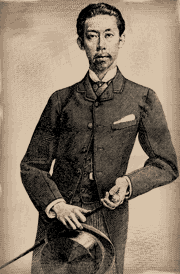An Illuminating Tale By the Master of Poetronomy, H. G. Peterson

H.G. Peterson is most well known for his portrayl of “Chippie” on the 1980s sitcom “Robo-Dad.”
I.
The death of Mr. Pickle came early in June, late in the afternoon and late in his life: He was ninety-one. Neither the life nor the death of Mr. Pickle perturbed Trepassey, an outport of six hundred souls at the edge of the Avalon, two hours south of St. John’s, in Newfoundland.
Once a week, Clarence Malloy, carrier and courier of people and things, stopped by the old man’s place to deliver, free-of-charge, smokes and a pint of Rhums’ Whiskey. He did this as an obligation he took upon himself. Clarence was honest but not known for his generosity. Few knew about his weekly visits in those last years of Mr. Pickle.
And Clarence knew about Bill Hayward, his wife and his son, neither of whom the people of Trepassey had seen in ten years. Though once gregarious, Bill’s wife one day disappeared into their house by the sea, an unseen woman thereafter. The boy, teased and taunted by his high school classmates for being shy and slow, went into that house one day and never came out. The house became an unfrequented, Gothic place. Gaunt and unpainted, it stood against the seashore and against the sea, holding the tragedy until the very end, against nearly everything.
II.
Years. Years and years and years, passing under her heightened vision and hearing like a lunatic parade, continually calling attention to itself. Some good. Mostly bad.
Though the consequences didn’t always work, and though she worked long at the feet of spineless men who were held up by their egos and cigar smoke, everything she did was right. Numerous closings and opening of doors—death, life. Everything: in her hands.
Granted, she might have married better and she did get into trouble, but she usually managed to turn whatever happened to her advantage, if not to the advantage of humankind.
She had the gift of belief. Nothing was beyond her belief. Some called it faith—but each of those words becomes a riddle, for even nothing as—or could be—within the sphere of her ready belief and ever-widening faith: Was and is. She believed and did not believe in nothing. Everything (and faith in everything even when not dreaming and nothing).
Believing in her own gifts, she might have used her heightened vision and hearing on her self, but she gave more than she got. It was impossible while her hearing stayed sound within the sound of the sea, not to listen to everything she herself said and to understand on it all seven levels.

But seeing herself was another matter—especially when it came to seeing what was in store and who was coming. Half heartedly she tried once or twice (but half a heart with twice the vision is never enough).
Looking on at herself in her mirror, at age sixteen or sixty, she saw an undifferentiated beauty, save for her green eyes. And now she was ready to lay it all down—to retire, she said. Looking on at herself, she might as well have studied the summer pond behind her house or a blank and faultless wall of light by the sea.
But not the light of an aging winter sky.
III.
At eleven, she knew she had special gifts and that she would have to be careful with them. That people would not understand. She had done everything, it seemed, since. And as a result she was fearless. Not afraid and without fear.
Trembling? No. Terrified, timid, full of dread (not necessarily with respect to any Danish thinker), frightened or alarmed or craven or cowering or shrinking from? Never.
Worried? Yes.
The way others lie on their backs painting chapel ceilings or build cathedrals, she did worry. But at fear? Dread? She only shook her head? Shaking that white head in a white corner.
The white flowers, dried-up long ago, stood against the white wall, reminding her of a white that was different and to which she could never return. She shook her head at those around her who were part of the parade. Who shook their heads wondering what to do with her, what to do with this force of nature: It was like trying to dispose of an ancient tidal wave, or pocket a spiral nebula or bury the wind under a column in Cordova.
IV.
Her name was Marya. They called her Mary. But she knew who she was and she was always Marya, an ancient soul from the itinerant camps of Avernus. Around her, now, like relative rabbits, they eat, they eat—oh my how they eat—with their moon faces shining youth and grease and all the strictured joys of reunion show it.
And who is that near her feet, tangled in the rhinoceros legs of a leaf-extended dinner table which is covered with a white table cloth as in a burial service, atop of which bones, crumbs, crusts and stains, the remains of a meal no one but children have enjoyed?
The adults had talked around the old woman as if she weren’t there, or as if she were.
